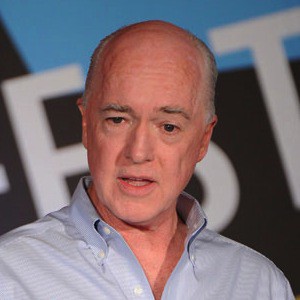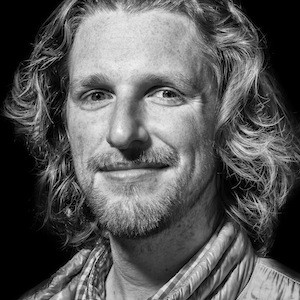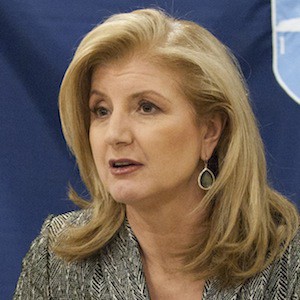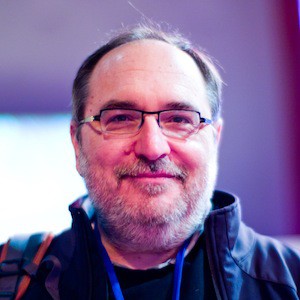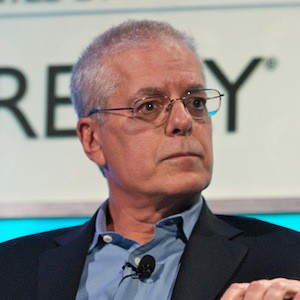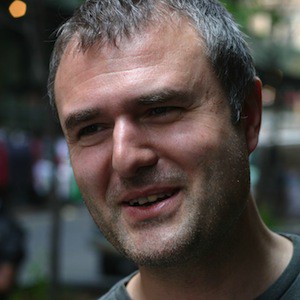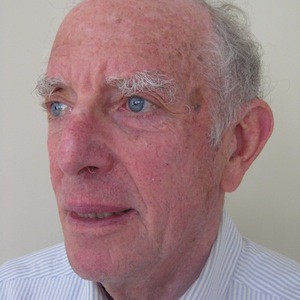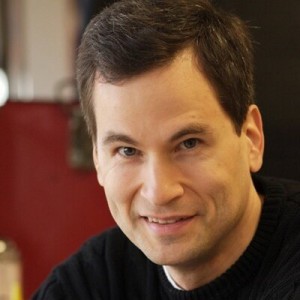John Huey: It is March 14th, 2013. We are in the world headquarters of “The Dish,” which is to say Andrew Sullivan’s smallish apartment in Greenwich Village of New York. We’re talking to one of the true journalism surfers of the Internet. He has blogged for mainstream media companies, he has blogged for disrupters, and now he’s blogging for himself and for you, the reader.
Andrew, I’m going to ask you the “first time” question. When was the first time that you realized that this thing called the Internet was going to transform either journalism or transform your life as a journalist?
Andrew: I knew it in an intellectual sense by the end of the ’90s. You just saw. At the same time, the ’90s was a time when there was this huge crash. I wanted, as a writer with a bunch of materials, to have a website. I thought I should have a website. Everybody else has a website. I had a good buddy. I didn’t know anything about it, so I said, “Would you please put my pieces up on the website so that there’s a resource I can build up?” An AndrewSullivan.com resource, we did that.
Every time I called him up to say, “Could you post a new piece of mine?” He would be, “Fine,” but it wasn’t his day job. Eventually, he said, “Here’s this new platform called Blogger.com. Why don’t you put up your own pieces?” [laughs] Politely. I was like, “Cool, sure!”
John: Was anyone blogging at the time? By the way, we’ve interviewed Dave Winer, who is one of the people who developed a blog. He’s talked about his…
Andrew: At the time, I don’t think there was…Maybe Mickey Kaus was, maybe? Blogger to me was a total revelation.
John: You weren’t copying anyone, you were just…
Andrew: No.
John: …finding a way to…
Andrew: I suddenly realized, when I put the first post up, I could put stuff up here that I hadn’t published elsewhere. This was the light bulb moment. There was another light bulb moment in June of 2000 when I was in England. I remember it. I was travelling from London to Oxford to see some friends. Actually, Niall Ferguson. I noticed the Evening Standard had its news…The Evening Standard used to be an afternoon paper. They always had those great billboards with some outrageous headline to make you buy it. Get on the train, everybody would…It was 4:00 in the afternoon.
I’m like, “Journalism has done this! It has actually produced material around the clock. Why don’t I just start writing at different times and provide the readers with the kind of journalistic service that the London papers are doing?” Seriously, it took just doing it to suddenly realize, “Why can’t I do this and do that and do the other?”
Then I said, “What do I write here? What is a post? What happens?” Essentially, I would read the New York Times when it came online at midnight. It used to all come on at once. I’d make fun of Maureen Dowd’s column before anybody had read it. This was, I felt, super fun. [laughs] As long as you don’t mind losing every friend you had in Washington, which I didn’t at that point, it was absolutely…
I borrowed freely from my work at The New Republic. Like, the “Notebook” of The New Republic, which is a bunch of little items of opinion that pointed out stuff. Then there was the “Diarist” at The New Republic, which I used to write much more personal, first person voice stuff, like your life.
Then Private Eye in London and The Spectator of London were also inspirations for me. Private Eye had Pseuds Corner. Readers sent in material for poseurs. Hence, our Poseur Alert. I slowly developed these little features that seemed like fun at the time.
Even the View from Your Window. One day I was like, “I’d like the readers to see what I see every day, which is the in tray,” which is a simply amazing litany and variety of people from every place on earth telling me stuff, communicating instantly. Not only instantly, but incredibly erudite, interesting people who were experts in their fields, obviously, and had things to tell me.
How do I get them to see each other? All they’re seeing is me. As an experiment, I said, “Why don’t you take a picture on your digital camera of what you see when you look out your window every day. We’ll do it for a week.”
John: You’re still [d]oing it.
Andrew: I can point to the post where I’m like, “Please stop.” [laughs] I was deluged with hundreds and hundreds. It’s just me, sitting in my room. First of all, I have to format these bloody things. What am I going to say? Now, it’s a feature that has become a book and also has a weekly contest that Chris Bodenner runs now as an art form on Tuesday. There are geography classes now that do the View from Your Window as part of their class. What’s fantastic about it was that one simply constantly improvised. It was so much fun. I didn’t have to ask.
[crosstalk]
John: [You were excited because it] talked back?
Andrew: Yeah, exactly! Now, some journalists aren’t likely to take to that very well. We won’t mention any names, but you can imagine. You’re thrown into this melee of conversation. Increasingly, I wanted their voices to be part of it, so they also became part of it. I did that for six years by myself.
John: That was from about 19…
Andrew: It was 2000 to 2006.
John: That’s you, yourself, AndrewSullivan.com.
Andrew: Around 2006, people in the media stopped asking me what a blog was. It took six years for [inaudible 11:33] .
John: That was kind of a dirty word at first, except for you and a few other people. Bloggers were characterized always as people sitting in their basement in their pajamas as opposed being in a…
Andrew: In a suit in an executive suite with a bunch of journalists.
John: Or in the Iraq bureau or whatever the…
Andrew: They weren’t wrong. [laughs] I was sitting…I do, do most of my blogging in boxer shorts. It’s true. I get out of bed. I get the coffee. I have these people basically drumming their fingers on a desk waiting for me to cough up some loogie of insight.
John: But it depends on who’s sitting in their underwear.
Andrew: Obviously, the underwear is not the salient characteristic of the blogger. It’s an accoutrement, but it’s not an essential character…
John: It’s the uniform, but not necessarily the…
Andrew: Of course, the point was…
Paul: It’s just a piece.
Andrew: What?
Paul: A consistent piece of the process.
Andrew: It is the one…I would have always my nightshirt, which had a bunch of ginger snap cookie remains that had melted in with the coffee. The beard was full of whatever it was at that point.
John: So, 2006, you…
Andrew: Then suddenly these people, Jake Weisberg at Slate, various other people say, “We’d like to include your blog.” Suddenly. It happened almost overnight. Since I wasn’t earning any money except for a couple of pledge drives, I thought, “That’s interesting. That might be worth doing.” I talked to Time and various others. There was a slight bidding war about it, which itself was interesting. They were understanding that there was a readership out there they weren’t reaching.
John: There was a reason that they came after you. You had something they wanted an audience, a buzz factor and they were willing to pay for it.
Andrew: Yeah, but not what I wanted. That was what’s interesting about the economics of this. I said to them, “Look, you are not hiring a writer. I am not going to be on a fixed salary like a staff member because I bring you…” Currently, I brought to The Daily Beast 1.2 million unique visitors a month. “That’s worth more than me just being a writer. I’m bringing all these people to your site. I want to be rewarded for that. If that grows in size, I want my salary to grow with it. You’re putting ads on these pages. I give you the page views, you get the money. I want a cut.”
John: No one did that deal?
Andrew: No, [laughs] not to start with. Time said, “That’s interesting. Yeah, I can see the argument in that. Let’s try this out for a while. Then we’ll go for year two, and we’ll figure that out.” I was like, “I just want to say this as a principle that I want my salary to go up next year in line with some kind of traffic incentive.”
The other thing that people don’t understand is that blogging is incredibly hard work. To produce 50 posts a day which we do…then, by myself, many fewer posts. But still, every day you have to have an opinion in on basically anything. You have to produce in a way that other journalists didn’t. It is a much more punishing regimen than regular journalists were used to. I also wanted a premium for that.
At the end of the year, they were not budging. They were like, “How can we agree to this? Who knows where this could go? You could end up earning a fortune if it suddenly took off.”
I was like, “Yeah, and you know what? If you have a decent ad department, you can sell. It’s a win win, right? It’s a total win win.” But they weren’t used to relationships with writers as partners. They were used to writers as employees.
Then David Bradley comes…I said, “No, I’m gone.” I was ready to give it up. The Atlantic comes along and gives me my dream deal. Their website is basically nowhere. “Would I come and kickstart it?” I said, “Yes, I will, on the basis that we do a three year contract and my salary is pegged to my page views.”
What Time feared is what happened at The Atlantic. The Obama year…I was among the first people to pick…That “Why Obama Matters” cover on The Atlantic suddenly made me the journalist that was the Obama guy. I already in the spring on the blog said he’s going to be the next president. When he won Iowa, you could look at our traffic. It was from universe into another universe.
I could tell you this. It starts here. It does that at 9/11, it does that at the Iraq war, and it does that with Obama. Since Obama it has grown pretty steadily, although we don’t know where we are now. Because we’re in this transition, we don’t know what the traffic will happen.
I got too expensive at The Atlantic for their comfort. Without going into any detail, we agreed eventually. Also, there was a slight conflict of philosophy in terms of what online journalism should be doing and how you want it to behave. I just had different vision.
John: Can you elaborate on that at all?
Andrew: I’ll try. They made me sign a legal agreement that I wasn’t allowed to talk about anything that happened at The Atlantic. I’m legally…
Paul: If we ask the question in a different way…Not to be cute, but just what should online journalism be?
Andrew: “Journalism” itself is a word that in some ways doesn’t work online, because it’s based on daily. This is not a daily. It’s not even a publication. It’s more of a broadcast. You’re a 24 hour broadcast channel, but of writing, at least at that point. At that point, there were no videos, really. It was just beginning. YouTube was beginning to move. We were beginning to embed videos and so on and so forth. I thought there’s no way you can re create a magazine online, because you don’t have any staples or any paper. Every page is like any other page on the Internet. It all has the same status, appears on the same screen. This was Matt Drudge’s great insight.
In 2000, I went down to Florida to pay my respects to the great Drudge. Again, I didn’t have any friends in Washington. I wrote a TRB why Matt Drudge is the best thing to happen to journalism in a long time, which was like talking about the turd in the punchbowl. That’s exactly what I was at the time. He said, “It’s a broadcast, not a publication. You’ve got to remember that.”
I thought you can’t package all these people in one bundle. People go to the writers they like. The way people encountered the Internet to begin with was porn and money, tech stocks, or plain email, and also “sex with [inaudible]” sites. These were the big… [laughs]
Basically, what I’m saying is that it was all person to person relationships. It wasn’t person to institution relationships. You couldn’t suddenly say all these people are one institution and you want to go there. I just didn’t believe that model could work.
No one gets up in the morning, goes online, and wants to go to Time, but they will go see Arianna Huffington or Matt Drudge or Andrew Sullivan or Glenn Greenwald or Josh Marshall. They know these people. The medium itself had emerged as that peer to peer thing.
My concept was, find a circle of great writers and bloggers. They were all different. You can’t really combine them. But let them be there. Have a diversity group, the only criterion being intellectual honesty. It didn’t matter right, left, middle, or just indefinable. Let’s start a conversation. It will be at the level of The Atlantic.
You create a discourse, an environment for bloggy chatting, and then you put out this really classy monthly magazine. In other words, I saw the model as being, get a bunch a bloggers out here who are your writers and helping your brand get its identity, and then put out this fantastic monthly print product. I think monthly print products have a future because they’re deep dives.
There are pond skaters and then there are plumb lines. The great thing about the blogosphere is that with a hypertext link, you could both do the pond skating but with a link, link to something that’s really quite deep and long and interesting. That put writers at the center of journalism online.
Now, if you’re running a company, that’s not what you’re particularly interested in. What you want is advertising. You want lack of controversy. You certainly don’t want stars. They’re dangerous. You don’t want to turn into a TV channel where you start having to negotiate Barbara Walters’ salary. The idea is that you chop up a magazine into lots of different sections that are essentially created for advertisers, what they call verticals.
You basically create the Internet journalism for advertising, not for writers. Whereas my view was, this great thing means I can write anything. No one can stop me anymore. This is a writer’s dream for a writer to reach his or her readership directly without any publisher, editor, colleague, advertiser, having to pass those hurdles, let alone the fact checker and the copy editor and getting it to Si. Liberation.
John: At this point, you’re one of the most successful, well known, most imitated of the blogosphere. You have helped lend credibility to commercial websites one mass, the other elite. You’re being imitated at all kinds of online publications. You have this philosophical…
Andrew: Difference.
John: …difference, and maybe economic. And then what?
Andrew: As long as I had in my contract total freedom of editorial content, they couldn’t touch me, which meant, of course, I could criticize what they were doing, which they didn’t like very much. Then The Daily Beast comes up and says, “We’re going to give you a real cut of the advertising revenue.” I’m not going to go into absolute details, but I would actually start getting ad revenue. By that time, I’d also found interns at The Atlantic who’d been able to…As the Web expanded….The Web, in 2000, when one man is blogging it, is manageable. There’s no way in 2013 one person can read the Internet or even grapple with it.
I developed this team of interns who would help me. They wrote memos. They would go into the Internet. I always called them leafcutter ants. They’d go out, find a nugget of interesting material, trundle it back, give me a memo. I would then write up…On top of my own stuff, I’d then look at theirs. It developed that way until it became a collaborative, organic process.
All the major people who are still at The Dish are former interns. That was also interesting. I realized that was beginning to create a magazine from scratch, like at The New Republic.
John: And a culture.
Andrew: And a culture, a sensibility, a high/low sensibility, a place where you can go and anything can be said, a mixture of quite high level stuff. You read philosophy and talk about god and theocracy, but then there’s also the penguins falling over “Mental Health Break” every day. It’s a mix, a very cultural, political mix. Then, of course, advertising starts to collapse online. Who wants to click on those banner ads? I can see the logic.
John: Now the bloggers are in the same place that the company is in.
Andrew: Exactly. Then you realize that yeah, great, half the advertising revenue after costs. Well, half of zero is still zero.
John: You finally got your piece of advertising right at the moment…
Andrew: It disappeared.
John: …when the advertising went away.
Andrew: Exactly.
Paul: The moment they said yes, you should’ve been suspicious. [laughter]
Andrew: I know. I should’ve been suspicious. I kind of was, but the concept…Remember, this was a while back. At that point The Dish had brought in at the last year at The Atlantic…Around 2009, it was looking good. They brought in $1.7 million in advertising money from my page alone. Part of me thinks half of that or at least some part of that would be amazing for a journalist but, of course, it didn’t work out that way. Then we had to hit the issue of “what now?” They were prepared…I could get a salary to do this blog, just about. It would be a good salary. I’d done very well as a blogger because I’d leveraged from site to site.
One of the smart things I did was insist in every contract that at the end of any time at one of these magazines, they are required to redirect that URL to whatever URL I want to point it to, so the readers move automatically to a new place. You can literally watch The Atlantic’s traffic quintuple in a matter of a couple hours. David Bradley gets very excited.
John: I’m familiar with that.
Andrew: [laughs] Yes, because that’s what happened when I went to Time. It kept getting bigger. That’s the thing. It kept getting bigger as we grew. Then we sat down over the last few months. At that time, Chris, Patrick and I had been working on this for several years. We were like, “Either we give it up…”
A large part of me was willing to do so. I was exhausted. There were health problems. The sheer toll of this on the human body is intense. I had a bad period of pneumonia. My doctors were telling me, “You either stop this crazy pace or you’re going to…”
They basically picked me up and said, “No. We have created something. We’re not letting this go.” When I bumped into Dish readers on the street or wherever and I said, “I think I’m giving it up,” they would respond with two words, “You can’t.” I realized this no longer was mine. This was a community, a passion, a community.
We sat down and said, “How do we monetize this? How do we make this work?” We really went blue sky. I’m not making this prettier than it was. We really did. We sat down and said, “Everything is on the table. What do we do? How do we do this? What do we want to do?” … We asked ourselves…We want to write and we want to write freely. We want to explore the world. There’s more to explore now. I think, for us, the great bonding moment was the Iranian revolution where went…We called it going cable, which meant that…In the old days of going cable, when you would just treat a news story and do nothing but this story.
Chris Patrick and I took shifts and basically covered the Iranian revolution morning, noon, and night for about a month and got amazing traffic. I think we innovated a new form of live blogging journalism, of raw material. The videos, the tweets that were coming directly. We were filtering them and editing them but we were really a channel for the opposition.
Then we found out that the opposition itself was loving our site. It was an amazing moment of catalysts, that we had something going.
But we realized that our core strength was the fact that these readers came back every day. That 73 percent of them had bookmarked us. That they spend an average of 17 minutes a day on the site, that they were passionate about this project and that they were increasingly giving us the content. They were having discussions about topics that we were turning into what we call reader threads. They were creating the content.
We thought, “Before we go to any billionaire or any advertising network,” although we explored and thought about all those things, why not ask our readers to just pay us to do this, and make it as simple as possible. We decided to go to a pay model. When we thought that, we thought the cleanest, clearest model is just to really go cold turkey. Take all the ads off, like the get advertising.
I was talking to another editor friend of mine in New York, because I asked advice from people about this. It had to be discrete at the time, but he’s like, “If you can get out of the advertising business right now, and survive, [laughs] do it. All of us want to do this. We’re all completely exhausted with this process, and it’s more and more work for less and less return.”
We thought we’d do it. We thought we’d just say, “It’s over to you.” I told Barry [Diller] and Tina [Brown] we wanted to go independent. Our contract was up anyway, so it would have to be renegotiated.
We’ve managed to find this company, “Tinypass,” which we’d just come from a two hour meeting with, that would have the technology to set up the “pay me,” the freemium model, the New York Times model. It would only take a pretty small cut of the revenues. That media had only been four months out of beta. This was very new.
I guess at my point in life, 20 years of HIV, I’m like, “Why not.” The worst that can happen is I can be humiliated and we’ll fail. But I also increasingly felt that unless journalists actually honestly went to their consumers and asked to be paid for what they do, in this medium, because this medium is taking over every other medium and will be all media at one point, then there’s no future for journalism at all.
Very few people actually want to read journalism, like news and analysis. The newspapers were able to sell them, the classifieds, the cartoons, the crosswords, the sports section, a whole bunch of stuff bundled together, but if you tried to sell them the op ed page, no one would buy it. If you tried to sell them the editorial page, I mean, people would ask you, “What’s that?” That’s what we knew as journalists.
John: How’s it going?
Andrew: That is a great question, and we are still trying to figure out the answer.
John: How far are we into this experiment now?
Andrew: We are six weeks into the beginning of the meter. [laughs] Yes. And only two and a half months since the establishment of “Dish Publishing LLC” as a company.
John: Well, the lights are on.
Andrew: The lights are on, yes. That’s my savings. I currently have no salary, [laughs] and we have no ads.
Paul: The whole audience come at first?
Andrew: It was a weird thing, because we knew we couldn’t keep this under wraps, so we knew we couldn’t do what we needed to do and then announce and then have the site ready. So we had to announce a month before. We had a month to get all this stuff done, which was crazy, to actually create a whole site, redesign it, set up the business, do things like payroll, taxes, lawyer, on top of doing the blog every day. We’re currently basically ready to drop dead, but we did it.
The response immediately, because we were able to put up, not a meter, but we were able to put up a link, to tell people if they want to pre subscribe to go here. We raised half a million dollars in basically three days from our readers. We are now at $640,000. We made about 110 grand in February.
Our fixed costs are, excluding the three of us who own the company, is around $400,000 a year, currently, just to do what we do. We’re already profitable, if Chris, Patrick, and I want to be poor right now. [laughs] That’s basically it.
But we have no debt. We didn’t want investors, even though we could have gotten plenty, I think, because the whole point of doing this is to be free of those pressures.
John: So you cut out all the middle men?
Andrew: We cut out every middle man available.
John: There are no agents, it’s just you and…
Andrew: There are no agents, yes, and them. They pay me and I write for them. They pay us and we assemble and we edit the Internet for them.
John: I’ve been trying to think of a historic precedent for this in terms of business transactions, and I haven’t come up with one yet.
[pause]
Andrew: You don’t have to have a million readers, you could have a thousand. It doesn’t have to be your only source of income, it can be a supplemental source of income. The whole point of this is beginning to understand how we can gain revenue and money without advertising. Let’s be realistic about this. The numbers online, as you know, are…Take them with a pinch of salt. You have two different versions. They seem to show completely different universes. We have about a million plus unique visitors a month. We have currently 25,000 or so subscribers.
But every day, we notice…You can have a unique visitor measure every day, as well. We find basically that every day about 80,000 people are showing up regularly. We have a very solid…It just doesn’t really go below that. That’s the beauty of The Dish. We’re stable. We developed this audience that’s stable. 25,000 out of 80,000 is pretty good.
John: You don’t want middle men. Would you rule out associates or other bloggers that you have respect for that could become part of the…
Andrew: The network?
John: Yeah.
Andrew: Not unless it makes sense to do so.
John: But if it enables you to leverage more reader revenue and some of your costs across a broader base and maybe someday pay yourself a salary?
Andrew: This is all to come, John.
John: But you’re not opposed to this.
Andrew: No!
John: This isn’t Thoreau. You’re ready to go…
[pause]
Andrew: I’m not Thoreau, but, yeah, there are plenty of opportunities to use this. The truth is that I do want to make a success. One reason is because it would be nice to be able to write for my own magazine, basically. The most rewarding experience in journalism has been working with my former interns and now colleagues at this enterprise. It’s a great group of people. That’s a wonderful thing to have. I don’t have to be that wealthy. This doesn’t have to dominate the media. It can just be what it is. That’s why I didn’t want investors pressing me to grow.
John: The technology that you work with is perfectly suitable now for what you do. There are all kinds of new disruptive technologies always coming.
Andrew: Always coming. You have to always be alert to them and try and shift to them. We have an RSS feed. We don’t have an app, actually. The blog is so “appy” anyway. It’s now what they call “responsive,” which means that it will fit the size of whatever tablet it’s on.
John: Your social profile? Do you spend a lot of time worrying about any of this?
Andrew: No.
John: You’re still a blogger, basically.
Andrew: Fuck yeah! [laughs] Yes! That spirit, the original spirit of, “I’m a blogger and I’m doing it because of freedom,” is still, I would say, my primary objective. I don’t want to become a Huffington Post. I don’t want to become anything but what we are. But I’ll tell you this. What we do want to do is to use this platform to start commissioning long form journalism, to take the blog form and get this readership and say to them, “We want to publish…” We can start on a monthly basis. “…a really good piece like the Steve Brill healthcare piece.” The kind of pieces that don’t get written anymore because these magazines don’t really exist or they’ve been hoard out.
Just say, “We’re going to pay the writer real money from your money. It will cost you $1.99. We’ll give a buck to the writer and 99 cents to us.” We’ll do it through our own…They’ve already got a payment system. It’s a one click. They’re already in our system. They’ve already got it. It’s easy.
Then you start resurrecting old form journalism that will be downloadable onto tablets from a blog community. In other words, from the blog, you re invent the magazine. Eventually, you could do a monthly…
My stage two model we call “Deep Dish,” which is an attempt to harness this energy, this visceral pond skating energy, for deep dives. Just mentioning that fact a number of people submitting stuff to us is way more than I can handle. I can barely get through the day right now doing The Dish. We’d need money to hire an editor and so on and so forth.
But that’s in the future. What we’re trying to do right now in the first 12 months is to establish that we have a model that can pay for us just to do what we do, which is modest. Chris used to have on his cubicle at The Atlantic, a Shepard Fairey poster, but of Charles Darwin. It just says, “Very gradual change we can believe in.”
From the very beginning, my whole view of the Internet has been, “Listen to it.” Don’t come at it as a journalist with your previous models of what journalism is and try and shove it on that screen. You’ve just got to live in it.
I’m a bit of a feral creature on the Internet. I was roaming the wilds of sex chat rooms and fast trading stocks at late night. I lived there and loved it. Loved the anonymity of it, loved the weirdness of it, the email. I love the fact that I don’t have to talk to people on the phone anymore. That’s something I don’t ever want to lose.
I think also that’s what the Internet’s about. That’s why it’s different than old, mainstream journalism. I can use expletives. I can put photos of corpses. I can raise issues like, “What on earth is Sarah Palin talking about with that weird pregnancy and labor? Can someone explain to me how this makes any sense?”
I can say I was wrong about Iraq. I can now, actually this month, 10 years later, re post stuff I wrote 10 years ago to show where I’ve come and grapple with it. There are so many ways in which this medium can be played with, have fun with. I think the idea is freedom and fun.
If we’ve made money…Potentially, I think, we could make a lot of money if we wanted to, but in the short term, it is to reinvest in good journalism and good writing. I’m afraid that there’s going to be a lost generation. There are people who were never taught how to write an essay, never taught how to write a book.
The old media institutions, for whom I felt a certain amount of pity as I saw them grappling with this, I now have lost the pity. A lot of them deserve to die. They are lazy. They haven’t really had a connection with their readers for a very long time. They’re learning, but most of them deserve to die, I think, at this point. Certainly, the entire book publishing industry should be pulped tomorrow. It’s a huge scam.
The idea is also to eventually publish my own books this way. Once you create a magazine really, it’s a different form of magazine, but a community basically online, a conversation online, it can then produce products and different projects, essays one offs, books, merchandise, but basically focusing on the writing. I think we can get revenue that way.
If we have to go to the advertising route, we will do it. If we have to. I have no philosophical objections to advertising, but I just feel that in fact we’re reaching a point, and this is my gut feeling, I don’t know market research on this, in which people would actually like to go to a page which has a lot of white space. It’s calm, it’s quiet.
They don’t have to tell which piece was written by some CEO from Chevron who has a slightly different hue of beige on it or something. They know they’re not having to click five times to read a whole article, because they’re trying to get page views out of you for ads. They just come to the thing. It’s an infinite scroll. They never have to go anywhere else.
If you want to unpack pieces, it will be happy enough to go to a separate page and click back. In other words, creating the simplest, purest, calmest, quietest. We want the highest signal to noise ratio on the Web. That’s what I’m trying to do.

